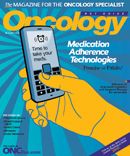Publication
Article
ONCNG Oncology
The Evolving Nature of Physician Use of Internet-based Communication with Patients
Author(s):
If there was any remaining question regarding the revolutionary impact of the Internet on communication between physicians and patients, a recent report provides a most provocative answer. In a survey conducted by Manhattan Research, "Physicians in 2012: The Outlook on Health Information Technology", it was noted that 39% of physicians use some form of electronic media such as e-mail, instant messaging, and secure messaging to communicate with their patients.
If there was any remaining question regarding the revolutionary impact of the Internet on communication between physicians and patients, a recent report provides a most provocative answer. In a survey conducted by Manhattan Research, “Physicians in 2012: The Outlook on Health Information Technology” (http://bit.ly/dlq2yU), it was noted that 39% of physicians use some form of electronic media such as e-mail, instant messaging, and secure messaging to communicate with their patients.1 Perhaps even more impressive was the fact that a mere 3 years ago, only 14% of surveyed physicians reported employing this communication strategy. As a group, oncologists followed only dermatologists as the physician specialty most likely to use online patient-related communication.
The reasons for the increase in the proportion of physicians who use the Internet for this purpose vary, but may include encouragement or pressure from patients, a belief the strategy improves the quality of care, and the realization that use of electronic communication may give a particular physician or medical practice a genuine competitive edge.2
Advantages for physicians who embrace this approach include the potential to respond quickly to patient-related concerns (eg, development of new symptoms or worsening of existing ones), the fact that electronic communication provides a formal record of a discussion (in contrast to a non-recorded telephone conversation), and the ability of physicians to perform such functions while away from the office (eg, at home, sitting in the car in heavy traffic, or between innings at their son’s or daughter’s baseball game).
Despite several benefits with this modality, many physicians continue to have concerns with the routine use of Internet-based communication with their patients.2 Issues include: liability for what is said or not in e-mail discussions; patient privacy (HIPAA), as electronic transmissions can be quickly, widely, and perhaps quite inappropriately disseminated; and limited data document in both the utility and relative cost-effectiveness of the approach compared with, for example, having a member of the support staff triage and directly respond to patient-related inquiries.
Many physicians have also noted receiving unsolicited e-mail requests for consultation regarding often complex medical issues from patients not currently under their care. This may be a challenging situation for a physician who may wish to help an apparently desperate patient, especially if the physician possesses information that may be useful in the setting described (eg, knowledge of the availability of a particularly promising clinical trial in a refractory malignancy). Physicians may be quite uncertain regarding the legality of such interactions with a patient previously unknown to them (eg, practicing medicine in states where they do not have a medical license), concerned about the privacy of these interactions, and unsure of the accuracy of specific facts that may be provided in this format. Finally, while the appeal to “Dr X” may appear to be quite personal, in fact it will be completely unknown if what has been received from “Patient Y” has actually been sent to 10 or even 100+ other “specialists” in this area.
Yes, there is simply no question that the Internet is a truly revolutionary communication tool. Physicians will need to carefully consider how they can appropriately incorporate this dynamic and rapidly changing technology into their professional responsibilities, recognizing that both the extent of the legitimate benefits and the potential pitfalls and serious risks associated with its use have yet to
be fully defined.
Maurie Markman, MD, is editor-in-chief of Oncology Net Guide and vice president of Clinical Research for University of Texas MD Anderson Cancer Center in Houston, Texas.
References
1. Dolan PL. Online contact growing between physicians, patients.amednews.com. American Medical News. www.amaassn.org/amednews/2010/02/15/bica0215.htm. Accessed May 3, 2010.
2. Hartzband P, Groopman J. Untangling the Web—patients, doctors and the Internet. N Engl J Med. 2010;362 (12):1063-1066. http://content.nejm.org/cgi/content/full/362/12/1063. Accessed May 3, 2010.
